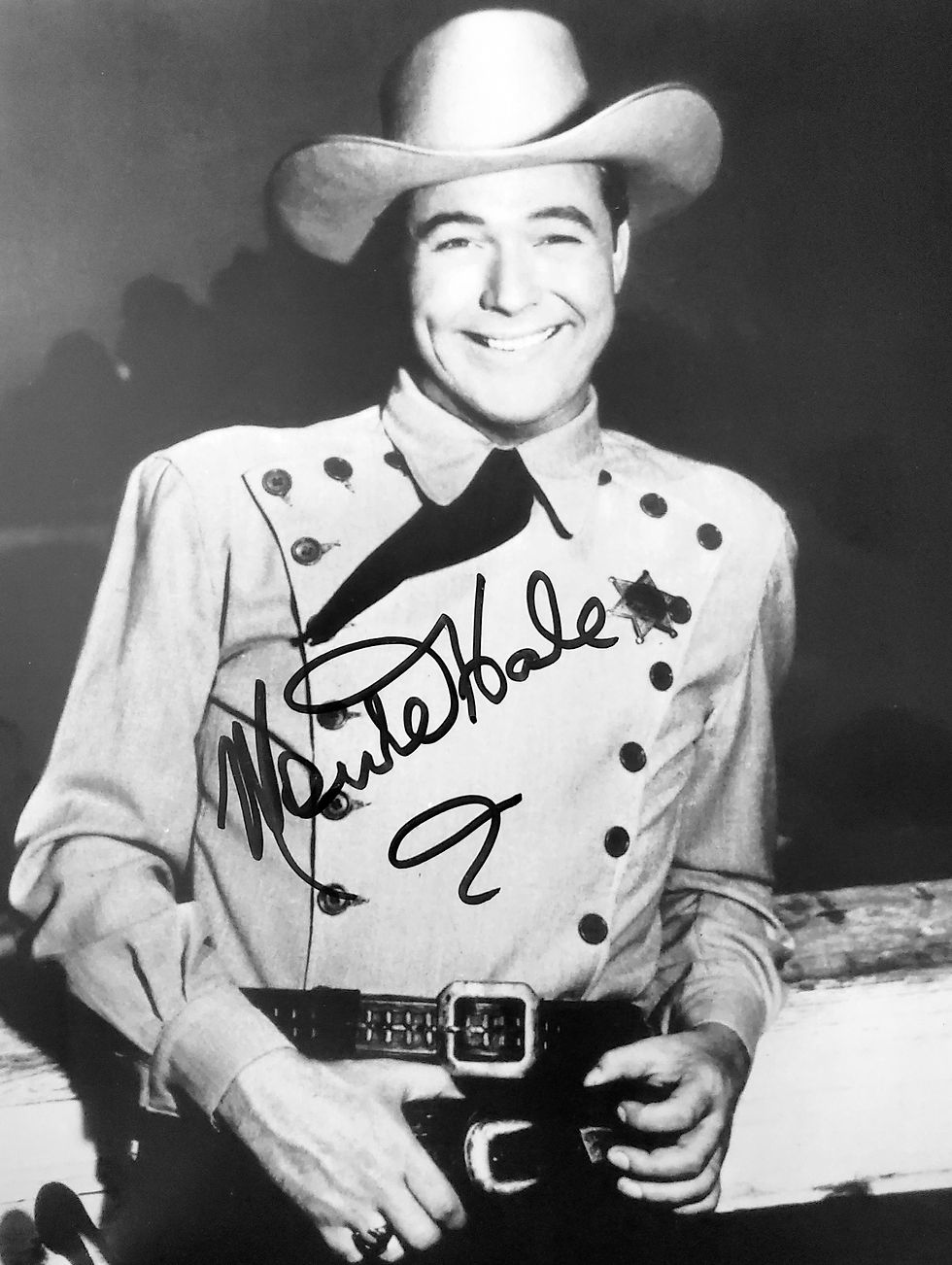Memories from the Homestead: Remembering Monte Hale and 'Home on the Range'
- John Fullerton

- Nov 14, 2024
- 3 min read
Today I'd like to tell ya'll about another one of my favorite Western personalities—Monte Hale. He had an MGM recording career. Eighteen singing cowboy films. A longtime statesman for singing cowboys and Western music, I was introduced to Hale thirty years ago on a televised Gene Autry movie cowboy reunion celebration.

Hale definitely came into the business with a splash, but slightly late in the game. When Gene Autry left Republic Pictures for Columbia, Republic felt the idea of having two singing cowboys was a successful plan to help balance the popularity of Roy Rogers who was about to enter his fourth consecutive year as number one box office star. The year was 1946.
I did some fact checking and love digging deep into genealogy of many of these folks. I was always told Hale was born in San Angelo, Texas. Nope! I discovered while gathering the facts for this piece, Hale was born in Ada, Oklahoma, on June 8, 1919. His birth name is Samuel Buren Ely. He grew up in Shawnee, Oklahoma, the son of a Church of God evangelist. Buren began performing in church at a young age, as a part of his father's ministry, and soon began performing anywhere he could find an audience. His parents divorced and both had remarried.
Buren left home at age sixteen in 1934, ending up in Texas, and got on radio in the Houston area. Becoming successful, he would later move to New Mexico and was soon convinced to continue his career in California. It was a difficult time; after four years in California he went back to Texas. During World War II he became a performer in the Stars Over Texas bond drive, which happened to feature several Republic Pictures stars from Hollywood.
This landed him a chance at a possible opportunity at Republic, but Herbert Yates, head of Republic, told Hale he would have to pay his way to California if he wanted to do a screen test. Hale's friends raised two hundred dollars to fly him to Los Angeles for the screen test. Yates signed him to a seven-year contract, and his name was changed from Buren Ely to Monte Hale. After a year-plus of small roles, his first solo feature film would begin production in November 1945.
One of the early "color" Western films, Hale's first picture, "Home on the Range" remains a longtime favorite of mine as it includes the musical talents of the Sons of the Pioneers.
The film is about two men, the Garth Brothers, who make a big purchase of some California land. One brother opens a large cattle ranch, while the other works a deal and uses his portion as a wildlife refuge. All of a sudden, bears are killing cattle. Anyway, it's quite a feature with some well-known names. Along with Hale, the leading lady was actress Adrian Booth, and a familiar name to many of you—Robert Blake—is featured in this film at twelve years of age. The Sons of the Pioneers played parts as ranch hands in addition to their musical chores. Their fine performance of "Over the Rainbow Trail," written by the group's war-time tenor Ken Carson, is just beautiful, and a clip of it can be seen on YouTube.
Hale would star in his next film, "Man from Rainbow Valley." Within two years, the national interest of Singing Cowboy films was on the downside, his final film was the 1950 release, "The Vanishing Westerner."
Making solo recordings at MGM, and touring frequently with Gene Autry's longtime friend Ray Whitley, Hale's career was pretty much wrapped up by the late 1950s. In the 1970s Hale participated in numerous Western reunion events and film festivals, a run that kept him quite busy well into the 1990s. Hale was quite instrumental in the foundation now known as The Autry National Center of the American West, in Los Angeles.
Hale received a Star on the famed Hollywood Walk of Fame in November 2004. Monte Hale passed at age 89 in Studio City, California, on March 29, 2009.
His comic book series was so popular in the 1950s, it actually outlasted his film career! Many of his items can easily be found for sale on eBay, including all eighteen of his feature films, 1946 through 1950, in a box set. His theme song "Happy" can also be found on YouTube from the "Home on the Range" film.
Wonderful times with a wonderful Western star.
Happy trails everyone!



Comments